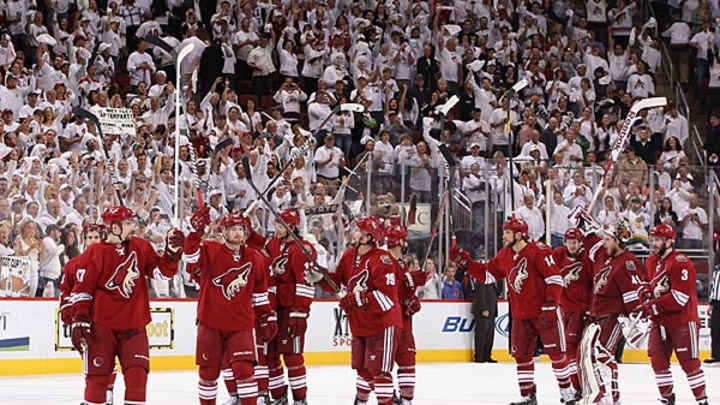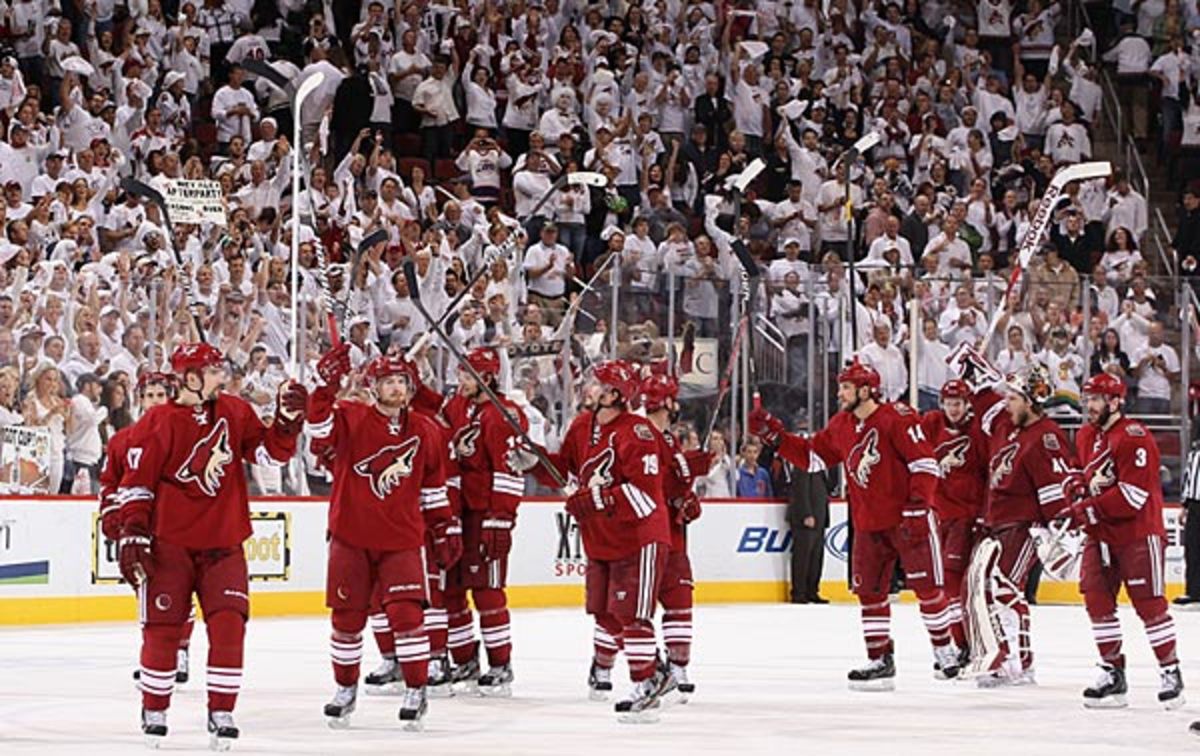'Muddy' Coyotes and their sale move on

After less than a thousand showed up at a "Save the Coyotes" rally in 2009, fans are now flocking to Jobing.com Arena to witness the team's stirring but unlikely playoff run. (Christian Petersen/Getty Images)

By Stu Hackel
It was a day of big possibilities in Glendale, and unless the Coyotes go on to win the Stanley Cup, May 7 could go down as the biggest date in the franchise's NHL history, both in Arizona and Manitoba. Not only is it the day that this team reached the conference championship round for the first time, but there were some strong signs that, after years of ownership uncertainty -- three of those years under the caretaker stewardship of the league itself -- some stability might be ahead.
Just like the Coyotes' chances of going all the way, the team's sale to Greg Jamison's group is no sure thing. Regardless, it was momentous evening for hockey in Arizona.
Everyone always wants to count the Coyotes out, both on and off the ice. Few expected them to survive against the Blackhawks or Predators, just as few expected them to win the Pacific Division or even make the playoffs. Stunted expectations are an annual thing for this club. And few expected they'd still be playing in Glendale in 2012, with yearly predictions of relocation or even a shuttering of the franchise a fixture in the media on both sides of the border -- especially among those who abhor the notion of a hockey club in the desert.
How a team manages to stay focused amidst non-stop rumors of its demise is something of a minor miracle. How it continues to win on a limited budget and often in front of sparse crowds (although not recently) is even bigger. Whatever plaudits have been directed at GM Don Maloney and coach Dave Tippett are insufficient. Together they have made this orphan club a winner, far more than merely respectable, and figured out how to keep the constant rumors from being a distraction.
The hockey that this team plays is not pretty. "Coyote ugly," was how their MVP goalie Mike Smith put it in one postgame interview and that's accurate. Tippett's own words about the 2-1 series clincher against Nashville provided all you need to know: "We made it muddy down front of our net and the mud won out at the end."
At one point during the game, which seemed to meander aimlessly in the second period with Phoenix up by a goal, I began counting each team's run of completed passes. The Predators rarely could string more than two or three together before a Coyote player broke it up-- and the first one was often an uncontested D to D pass. Phoenix was more able to put three or four passes together before a Nashville player interrupted their flow. Long stretches of the game looked like that, but the Coyotes were able to penetrate more effectively and eventually it paid off for them when they put these three passes together for the game winner:
You can see all the mud in front of the net. You also see a full Jobing.com Arena, which you didn't see often during the regular season -- the Coyotes had the lowest average attendance in the NHL -- or even in the earlier stages of the playoffs. And that, more than anything, symbolizes the hope and fear for this club going forward.
It's no secret that Glendale is an awful location for an NHL team in this large market -- the 12th biggest in the U.S. -- and the story of how the Coyotes ended up there is now an old one as well as irreversible. It's in Glendale, in the western part of the Phoenix Valley far from the area's wealth and potential fan base in the east where, unable to lure fans, the franchise has annually bathed in a tub of red ink estimated at between $20 and $25 million. But, at the league's longstanding insistence, it's in Glendale where the franchise will continue to make its stand, fighting off elaborate efforts to spirit the club elsewhere.
Here's another area where things have gotten muddy and it has had nothing on the way Dave Tippett coaches: A series of potential owners has been unable to figure out how to make the numbers work. It's a situation complicated by a variety of factors besides low attendance. The City of Glendale financed and owns the arena and has its own fiscal challenges with which to contend. The city requires a lease from the club that won't push Glendale further into financial peril. Those who would own the Coyotes, recognizing the attendance and related revenue problems plus Glendale's need for an anchor tenant in the building, have tried various creative solutions to get the city to help cover their potential losses. That has led to objections from the local conservative watchdog group, the Goldwater Institute, which claims that the Arizona constitution prohibits the excessive use of public money for private enterprise. A potential bond issue last year was scuttled because of the Goldwater Institute's threat of a legal challenge.
For a while this year, it seemed as if the Coyotes had run out of options and that got the citizens of Quebec and Seattle pretty excited. Even the NHL acknowledged in March that if progress wasn't made soon on a sale, the league would have to consider relocation. But progress apparently was made and, on Monday, Jamison and Gary Bettman met the press to give an update. There's no deal yet, but they have a preliminary agreement; the sale can't happen until Jamison's group secures the necessary financing and formalizes his purchase agreement with the league, and that involves negotiating a lease with Glendale that gets approved by the city council. The NHL Board of Governors must also bless it all.
Just who Jamison's partners are has yet to be revealed, and you might think it strange that anyone would want to own a team that seems fated to continually lose mountains of money. But Glendale, fearful that it could end up with an arena without a major sports team to occupy it, apparently will fork over about $14.5 million annually for 20 years to the club in order to manage the building for the city. Or at least that is the plan that will go before the city council. Jamison and Bettman say this deal will be structured in such a way that they don't anticipate the Goldwater Institute being able to interfere. The Goldwater people aren't so sure.
Meanwhile, the best thing that could happen is happening: the Coyotes are winning and the building is full. How much of that is bandwagon jumping to follow the excitement of a team making a deep playoff run? Hard to say. It's difficult to forget the images of a mere 200 to 500 (depending on which report you believed) fervent fans attending the "Save the Coyotes" rally in 2009.
By contrast, when the original Jets were about to leave Winnipeg in 1995, around 55,000 fans rallied to save them.
Regardless, it's heartening to see the "Whiteout" at Jobbing.com. Whether that translates into season tickets, corporate sponsorships and the other types of long-term support that the Coyotes will require to erase all the doubts about their future, we won't know for a while.
COMMENTING GUIDELINES: We encourage engaging, diverse and meaningful commentary and hope you will join the discussion. We also encourage, but do not require, that you use your real name. Please keep comments on-topic and relevant to the original post. To foster healthy discussion, we will review all comments BEFORE they are posted. We expect a basic level of civility toward each other and the subjects of this blog. Disagreements are fine, but mutual respect is a must. Comments will not be approved if they contain profanity (including the use of abbreviations and punctuation marks instead of letters); any abusive language or personal attacks including insults, name-calling, threats, harassment, libel and slander; hateful, racist, sexist, religious or ethnically offensive language; or efforts to promote commercial products or solicitations of any kind, including links that drive traffic to your own website. Flagrant or repeat offenders run the risk of being banned from commenting.
